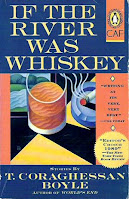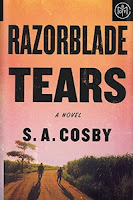Other year-end lists celebrate the sublime, and I will get there, too. Just not today. Today, I start my 2022 reading recap as I always do: by sparing other readers the books that I wish I'd been spared myself. Life's too short.
Worst of the Year: Fiction
in which, I note as I write this, I take issue more with editors than with authors while griping about books I got for free due to the kindness of strangers (what a peach!)
Razorblade Tears, S.A. Cosby, 2021
Having enjoyed and been intrigued by S.A. Cosby's Blacktop Wasteland, I put the follow-up book on my to-read list. Imagine my delight when I saw a copy in a neighborhood Little, Free Library. Sitting down to write this review of that follow-up book, I had a whole theory that Razorblade Tears's flaws could be explained by a rush to publication following the acclaim of Cosby's debut in Blacktop Wasteland. Then, I discovered that Blacktop Wasteland followed his actual debut, My Darkest Prayer, by a year. Who knew? My theory may still hold because Blacktop Wasteland got much more critical love, winning the LA Times Book Prize and being lauded by the NY Times and NPR. In reading Razorblade Tears, I discovered that the Book of the Month Club still exists - the cover bears multiple marks for the distinction of being the Club's selection for July 2021.
It seems rushed to production because it's poorly edited, falls into weak patterns, and has at least one automotive plot hole. Or is that plot hole a red herring? In the "thriller" genre, does one ever really know? So yeah, typos don't quite abound, but there are enough of them to elicit a reader's exasperated "sheesh." Beyond that, though, editorial laziness appears in the form of a clumsy phrase repeated verbatim in two different places in the book. Also, characters whose bodies get absolutely messed up in Cosby's signature over-the-top violence just keep going as if nothing has happened like superheroes. Also, no one they encounter comments on the blood and bruises that must be covering them. Also, things happen in time and space that don't quite seem possible. Too much happening in too short a time. A grand estate being described as a half-acre lot (so, a tiny grand estate?). A small business owner neglecting his business for what seems like weeks on end. And that's after his faithful and capable assistant decides not to return to work after experiencing over-the-top violence in the workplace. Poor execution throughout, which is a shame. You don't need to know about the dumb plot because you shouldn't read this, but it's two homophobic dads who investigate the murders of their married gay sons because no one else is doing anything about it. I was so happy to finish this book and move on to something else.
If the River was Whiskey, TC Boyle, 1989
 So many times walking past a Little, Free Library, I see nothing I would want to read. Every so often, though, I see a book by an author I at least know. So it was with this paperback TC Boyle story collection. Having enjoyed his novels and having had my trust with the short story collection genre rebuilt by some recent successes, I grabbed it not without some trepidation. Short stories have eaten away at my trust by relying too heavily on magic for plot. The thrill of the close observation of characters figuring their way out of challenging situations gives way to disappointment when the path into our out of the challenge is paved with magic. It's lazy writing. Like a foster kid who finds himself in a good placement after several bad ones, I told myself a few stories into this tome that it wasn't so bad in the world of Boyle's stories. His writing is crisp, and he captures the human condition well. The plots were varied and - having been written not later than 1989 - had all of the advantages of a time before cell phones - smart ones in particular. Since I remember 1989 well, it feels strange to say these stories transported me to a different time, but I must. Boyle brings us the Ayatollah's PR man, people dating as safe sex emerges as a necessity, and a low-end performance artist who becomes a sensation. Around the halfway point of the collection (almost to a page), however, I began to detect an editorial strategy of putting the stories roughly in order of craziness. By the end, there was magic, but more than that, there were characters so awful or stupid as to be really hard to read. The fun drains out of the enterprise at that point for me. The title story is last, and it's definitely among the best. A devastating and finely observed few days in the life of a family with troubles. Not happy, but if the whole book had been like that - eschewing shortcuts - I would have enjoyed it much more.
So many times walking past a Little, Free Library, I see nothing I would want to read. Every so often, though, I see a book by an author I at least know. So it was with this paperback TC Boyle story collection. Having enjoyed his novels and having had my trust with the short story collection genre rebuilt by some recent successes, I grabbed it not without some trepidation. Short stories have eaten away at my trust by relying too heavily on magic for plot. The thrill of the close observation of characters figuring their way out of challenging situations gives way to disappointment when the path into our out of the challenge is paved with magic. It's lazy writing. Like a foster kid who finds himself in a good placement after several bad ones, I told myself a few stories into this tome that it wasn't so bad in the world of Boyle's stories. His writing is crisp, and he captures the human condition well. The plots were varied and - having been written not later than 1989 - had all of the advantages of a time before cell phones - smart ones in particular. Since I remember 1989 well, it feels strange to say these stories transported me to a different time, but I must. Boyle brings us the Ayatollah's PR man, people dating as safe sex emerges as a necessity, and a low-end performance artist who becomes a sensation. Around the halfway point of the collection (almost to a page), however, I began to detect an editorial strategy of putting the stories roughly in order of craziness. By the end, there was magic, but more than that, there were characters so awful or stupid as to be really hard to read. The fun drains out of the enterprise at that point for me. The title story is last, and it's definitely among the best. A devastating and finely observed few days in the life of a family with troubles. Not happy, but if the whole book had been like that - eschewing shortcuts - I would have enjoyed it much more.
Worst of the Year: Non-Fiction
Comedy, Henri Bergson and George Meredith, 1877, 1900, 1956
Keegan Michael Key referenced this book on Mike Birbiglia's podcast. Although our library system lists a copy, it turned out to be missing from the shelf when I looked for it. I found a paperback copy online though an independent bookseller. This is a strange little book. The volume I got collects Henri Bergson's long essay "Laughter" from 1900 with George Meredith's shorter 1877 "An Essay on Comedy." Professor and non-fiction writer Wylie Sypher edited the collection, published by Johns Hopkins in 1956, and supplies an introduction and an appendix. Having read the introduction and slogged through the Meredith, I found the Bergson more accessible than either. But then I noticed that Cypher's appendix runs another 65 pages. My force of will and obstinacy could only get me to the end of the "Laughter" essay. This is basically late-19th-century philosophy on comedy. And you know who has two thumbs and never reads philosophy? This guy. Ninety percent of both Meredith's and Bergson's references are to Moliere. As it happens, I have had some exposure to Moliere, including as a high school theater parent. My skim level of knowledge was not enough to make philosophizing about what is funny - or rather, what was funny in the 1870s-1890s - interesting. Bergson wrote his essay from 1884-1900. For posterity, the main theses here are: something's funny when it's repeated, or repeated and morphed, or when people act in an automatic way beyond their power. Something has to be human to be funny. Animals are only funny to the extent that they remind us about how humans behave.
Self-Compassion; Stop Beating Yourself Up and Leave Insecurity Behind, Kristin Neff, 2011
This book lingered on my list for quite a while after I heard about it from Caroline Ealy, the 20-something cohost of the podcast Good Christian Fun. When I finally started reading it, I doubted the wisdom of taking book recommendations from 20-something podcast hosts. Neff's concepts don't strike the more wizened, hard-bitten middle-aged man who's been to some therapy and read much better self-help books as very profound. Neff has created the academic research area of self-compassion, which she describes as having three parts: self-kindness, recognizing our common humanity, and mindfulness. Because of the attention that self esteem gets, Neff has to continually contrast her self-compassion concept with that. This is not about telling oneself how great one is. It's about acknowledging what is, good or bad. In particular, it's about dismissing the critical voice that inhabits a lot of our heads, or rather telling it "this is a moment of suffering; I'm suffering right now, and I'm going to be compassionate to myself for that suffering." I persisted in reading the book despite not loving it in hopes that Neff's dopey-sounding message of being kind to myself would break through my defenses. It kinda did. This is the most self-helpy book I've read in a long time, complete with exercises in the middle of the chapters (which I didn't do). In shorter sections revealing her own personal life and experiences, Neff does some of her best work. Particularly at the end of the book, the concepts come together in her personal and family story in a way that does reach the profound. This book may be the thing that certain readers need to really break through troublesome patterns in their lives. Others may come at it like I did, more skeptically and reluctantly. There's good stuff here for all even if the experience of reading it doesn't light up all of the revelation and insight sensors Neff might think it will.








No comments:
Post a Comment